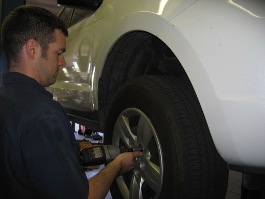 You can make the tires on your vehicle last longer with a regular tire rotation and balancing.
You can make the tires on your vehicle last longer with a regular tire rotation and balancing.
Let’s start with the tire rotation. In normal driving around town, your front tires wear more on the shoulders because they handle most of the cornering forces in the turns. If you’re driving a front-wheel drive vehicle, there is even more force put on the front tires.
The reason we rotate the tires is so that all of the tires have some duty on the front end and it also gives the back end a little break. By doing a tire rotation, all four tires should wear more evenly over their life, this helps them last longer.
Most vehicles have their tires rotated front to back, but some manufacturers recommend a cross rotational pattern that includes the spare tire too. If you drive a high performance vehicle, they might have different size tires on the front and rear, or they may have unidirectional tires that can only be on the left or right side of the vehicle. If you drive this type of vehicle be sure to ask your service adviser to help you figure out just the right tire rotation for your vehicle.
Tire manufacturers always have recommendations for how often they want you to rotate your tires. These recommendations usually fall somewhere around 5,000 to 8,000 miles or 8,000 to 13,000 kilometers.
Now let’s talk about wheel balancing. Balancing is when there are heavy spots on the tire and wheel that causes it to wobble.
Wheel balancing is adding weights to the wheel that balance it out so it doesn’t wobble. These are very small weight differences. There are variations in tire and wheel manufacturing that can cause slight imbalances. The valve stem and the tire pressure monitoring sensors in the tire can also make a difference.
Even small differences can cause annoying vibrations. The wheel is basically bouncing as it travels down the road. Say you were driving on the freeway, if your wheel is out of balance it can slam into the road 14 times a second. Besides being annoying it also causes your tires to wear out quicker.
If you have a front wheel out of balance, you’ll feel a vibration in the steering wheel, and a rear tire will vibrate your seat. If you have any type of vibrations in your vehicle, come in and see us. We’ll see if it’s a balance issue or another problem.
